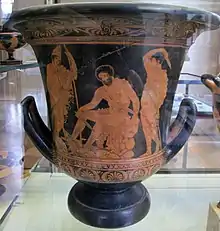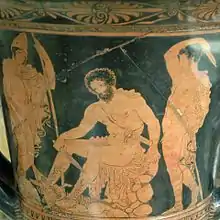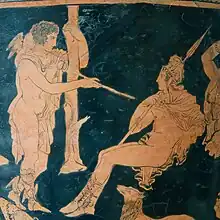Odysseus in the Underworld krater
The kalyx-krater used measures at 48.4 cm in height and 49.8 cm in diameter. It has a pair of curved handles emerging from the lower body of the vessel and sprouting outward to the lip.[4] The Odysseus in the Underworld krater is a Lucanian calyx krater decorated in the red-figure style dating to ca. 380 BC – ca. 360 BC.[5] It was found in Pisticci, south Italy and is believed to be the work of the Dolon painter, a famous Lucanian red-figure vase painter who worked in the Metaponto workshop and had a particular affinity for large krateres and mythological scenes.[6] The krater is now at the Bibliothèque Nationale in Paris.[5]



Depictions
A side
The A-side scene on the belly of the kalyx-krater depicts Homer's story of Odysseus's visit to the Underworld to consult the dead seer Teiresias. This meeting is known as a nekuomanteion or "consultation with the dead".[4]
Odysseus is seated in the middle of the scene on uneven ground; he is seated between Eurylochos, second-in-command of Odysseus' ship during the return to Ithaca after the Trojan War, and Perimedes, one of Odysseus's companions during his return voyage from Troy, awaiting the consultation with the ghost of Teiresias. Odyseus is wearing boots and has a short sword in his right hand. There are two dead rams directly underneath Oddyseus's sword, a sacrifice needed to summon the dead for ghosts cannot speak until they have drunk blood.[7]
B side
The scene on the B-side of the krater depicts the Judgment of Paris, where Hermes (on left) asks Paris, the Trojan prince, to arbitrate the contest between Aphrodite, Hera, and Athena and determine who is the most beautiful. The scene is so well detailed that many scholars describe the krater as having a “double A-side”.[4]
See also
References
- Dolon, English: Dolon PainterFrançais : Peintre de, English: Odysseus consulting the shade of Tiresias. Side A from a Lucanian red-figured calyx-krater, 4th century BC., retrieved 2017-12-04
- "Category:Dolon Painter - Wikimedia Commons". commons.wikimedia.org. Retrieved 2017-12-04.
- Dolon, English: Dolon PainterFrançais : Peintre de, English: Hermes (on the left) asking Paris to arbitrate the contest between Athena, Aphrodite and Hera. Detail, side B from a Lucanian red-figured calyx-krater, ca. 380 BC., retrieved 2017-12-04
- Cardiff III, Hal Victor (May 2015). "Drinking with the Dead: Odyssean Nekuomanteia and Sympotic Sophrosyne in Classical Greek Vase Painting" (PDF).
- "Paris, Cab. Méd. 422 (Vase)".
- "Term details". British Museum. Retrieved 2017-12-04.
- Robertson, Martin (1992). The Art of Vase-Painting in Classical Athens. Cambridge University Press. ISBN 9780521338813.